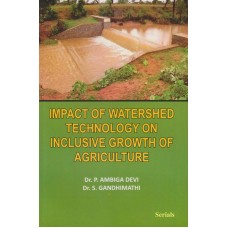Impact of Watershed Technology on Inclusive Growth of Agriculture |
Author :
Dr. P. Ambiga Devi & Dr. S. Gandhimathi
ISBN: 9788183877350
Year: 2015
Pages: 237
Binding: HB
Publisher Name: Serials Publications Pvt. Ltd.
ISBN: 9788183877350
Year: 2015
Pages: 237
Binding: HB
Publisher Name: Serials Publications Pvt. Ltd.
Price:
Price in Dollar: $30
INR 850.00
Price in Dollar: $30
Qty:
Demand for water in India is growing due to population growth, green revolution, increasing standard of living, improper storage of water facilities available etc. According to 2001 Census, India was placed in the 2nd position in the world population. It is expected to overtake the China's population in future. It was estimated that total demand for water will increase from 813 bcm in 2020 to 1180 in 2050 and this demand for water for irrigation purpose alone will be 807 bcm in 2050. Demand for drinking water will increase from 56 bcm in 2020 to 102 BCM in 2050. Development of water resources was not equal in all the regions and not distributed equally for all groups of farmers. The study by Rahul Shastri (2011) in Andhra Pradesh shows that while eighty two percent of the large farm units were irrigated through tank water, only 17 percent of the medium farms were irrigated through tank water. The share of small and marginal farmers was negligible. Devender (2011) found that regional disparities in water resources existed in the state of Andhra Pradesh. It was the result of unequal distribution of employment opportunities for agricultural labourers. According to him, irrigation development leads to inclusive growth in agriculture. It would lead to overall economic development. There is an urgent need to give high priority to develop balanced irrigation facilities to remove regional disparities and to improve inclusive growth in agriculture across the regions of the state. Watershed development programmes in this context is considered as an effective tool for water conservation and is recognized as a potential engine for agriculture growth and development in fragile and marginal rain-fed areas. Watershed development programme produces multiple benefits in terms of increased food production, improved livelihoods, protected environment, addressing gender and equity issues along with biodiversity concerns . In this context, it becomes imperative to find out the impact of watershed technology on ground water resources and its recharge level, cropping pattern, agricultural production and the socio economic conditions of the farmers and whether it has led to inclusive growth. Though studies have been carried out in assessing the impact of watershed technology on soil and water conservation and the impact on agricultural production and cropping pattern none of them dealt with the impact of watershed technology on inclusive growth of agriculture. They did not link the agricultural production and disparity in the distribution of water resources. Moreover, none of the studies did not analyse the impact of disparity in the distribution of water resources on farm income. In this book, advanced econometric tools and approaches such as the economic surplus model, probit regression analysis, cropping intensity indices, endogenous switching regression models, endogenous switching frontier production function were used to analyse the exiting situation and to find out the solution. We believe that this book on impact of watershed technology on inclusive growth of agriculture in Coimbatore district will be more useful for researchers to approach the research problem in a new way and it will let them to get better solution. This book will be more useful for evolving new policy measures for policy makers. This book is an outcome of the ICSSR Research project. Therefore we are kindly acknowledge Indian Council of Social Science Research for funding the research project.
Write a review
Your Name:Your Review: Note: HTML is not translated!
Rating: Bad Good
Enter the code in the box below:




